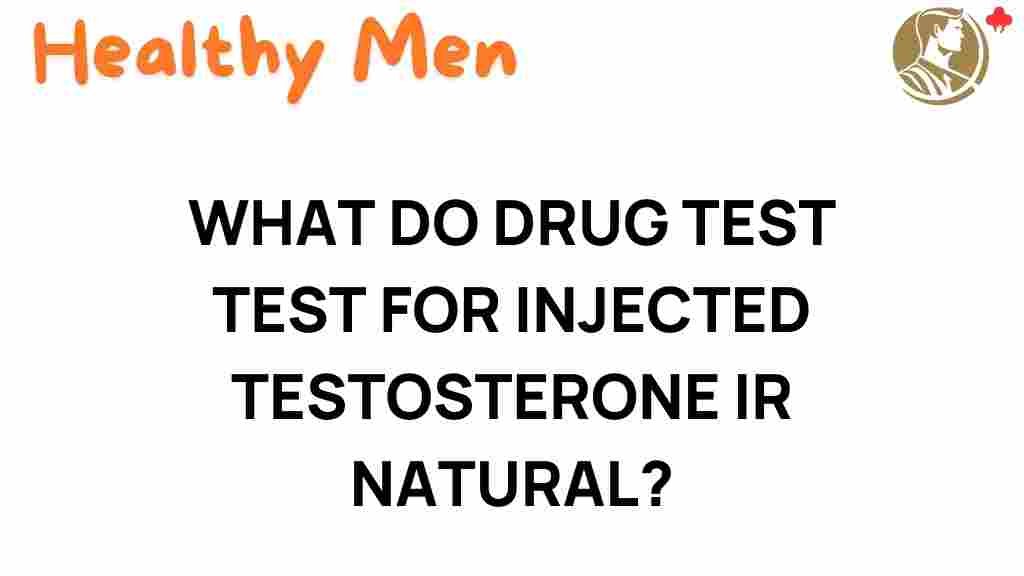Unraveling the Mystery: What Drug Tests Really Detect in Testosterone Use
When it comes to performance enhancement in sports, the topic of testosterone use and drug tests is often shrouded in confusion and misinformation. Athletes and fitness enthusiasts alike are seeking ways to optimize their performance, leading some to consider anabolic steroids and hormone therapy. However, the implications of using these substances extend beyond mere performance gains. Understanding what drug tests really detect in relation to testosterone use is crucial for maintaining athletic integrity and safety.
Understanding Testosterone and Its Role
Testosterone is a crucial hormone found in both men and women, playing a significant role in muscle growth, strength, and overall physical performance. In the world of athletics, testosterone is often associated with:
- Anabolic Steroids: Synthetic derivatives of testosterone that promote muscle growth and enhance performance.
- Performance Enhancement: Athletes may use testosterone to improve their endurance, strength, and recovery times.
- Hormone Therapy: Used by individuals with low testosterone levels to restore normal physiological function.
However, the use of testosterone and its analogs raises ethical questions regarding athletic integrity and the spirit of competition.
The Mechanics of Drug Tests
Drug tests are designed to detect specific substances in the body, and understanding the detection methods is vital for athletes considering testosterone use. Here’s a step-by-step breakdown of how drug testing works:
- Sample Collection: Drug tests typically involve the collection of urine, blood, or saliva samples from the athlete.
- Initial Screening: The samples undergo an initial screening process, often using immunoassay tests, which can quickly identify the presence of certain substances.
- Confirmatory Testing: If the initial test is positive, a more sophisticated method, such as Gas Chromatography-Mass Spectrometry (GC-MS) or Liquid Chromatography-Mass Spectrometry (LC-MS), is employed to confirm the presence of testosterone or its derivatives.
- Detection Windows: The detection time varies depending on the substance used, the dosage, and the individual’s metabolism. Testosterone can often be detected for days, weeks, or even months after use.
Detection Methods for Testosterone
There are several detection methods used in drug testing for testosterone, each with its pros and cons:
- Urine Tests: The most common form of drug testing. These tests can detect both testosterone and its metabolites, such as epitestosterone, which is often measured to identify the use of exogenous testosterone.
- Blood Tests: More invasive but can provide a clearer picture of testosterone levels in the body. They are particularly useful for measuring testosterone levels in real-time.
- Saliva Tests: Less common but can detect testosterone levels, providing a non-invasive option for testing.
Each method varies in terms of sensitivity and specificity, influencing the likelihood of detecting testosterone use.
Regulations and Safety Concerns
The use of testosterone and anabolic steroids is heavily regulated in most sports organizations. These regulations are essential for maintaining fairness and safety in athletic competition. Here are some key points regarding regulations:
- World Anti-Doping Agency (WADA): Sets the standards for drug testing in international sports, including what substances are banned and the protocols for testing.
- Therapeutic Use Exemptions (TUEs): Athletes with legitimate medical needs for testosterone can apply for exemptions, allowing them to use the hormone legally under specific conditions.
- Consequences of Violations: Testing positive for banned substances, including testosterone, can lead to severe penalties, including suspensions and loss of titles.
Understanding these regulations is vital for athletes who want to ensure they are competing fairly and safely.
Ethical Considerations and Athletic Integrity
The use of testosterone and anabolic steroids raises significant ethical questions in sports. The pursuit of performance enhancement can compromise the integrity of athletic competition. Some ethical considerations include:
- Fair Competition: The use of performance-enhancing drugs creates an uneven playing field, undermining the essence of sportsmanship.
- Health Risks: The potential health risks associated with anabolic steroid use can outweigh the benefits, leading to long-term health complications.
- Role Models: Athletes are often seen as role models. Their choices regarding performance enhancement can influence younger athletes and the next generation of competitors.
Troubleshooting Common Issues with Drug Tests
For athletes concerned about drug testing, there are common issues that can arise, along with potential solutions:
- False Positives: Occasionally, legitimate medications can trigger false positives in drug tests. Athletes should keep a detailed record of all medications and supplements taken and consult with a medical professional.
- Understanding Detection Times: Athletes should be aware of the detection times for testosterone and other anabolic steroids and plan accordingly. Stopping use well in advance of competition is crucial.
- Consulting Experts: Athletes should seek guidance from sports physicians or certified professionals regarding the safe use of any hormone therapy.
By addressing these issues proactively, athletes can better navigate the complexities of drug testing and remain compliant with regulations.
Conclusion
Understanding what drug tests detect in relation to testosterone use is essential for athletes striving to maintain their performance while ensuring athletic integrity. The interplay between testosterone, drug tests, and regulations is complex, and athletes must educate themselves on the implications of their choices. While the desire for enhanced performance is common, the potential health risks and ethical considerations must be weighed carefully.
For those interested in learning more about the regulations surrounding testosterone use and drug testing, you can explore additional resources at the World Anti-Doping Agency’s website. Remember, the road to athletic success should prioritize integrity, safety, and health above all.
As the conversation around performance enhancement continues to evolve, staying informed and making responsible choices is not just beneficial for individual athletes but for the overall integrity of sports.
This article is in the category Conditions and created by healthymen Team
